HKJ
Flashaholic
[size=+3]Charger LiitoKala Lii-500S[/size]
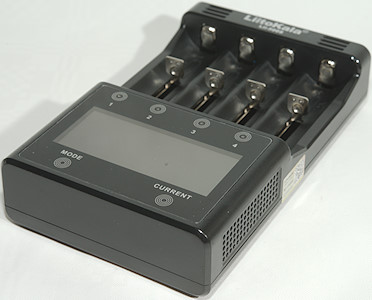
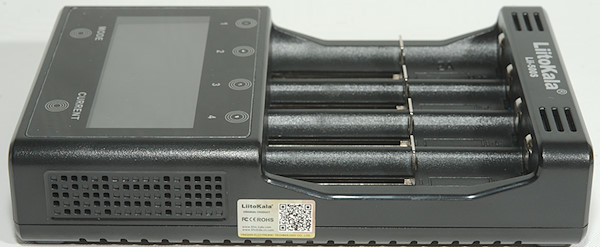
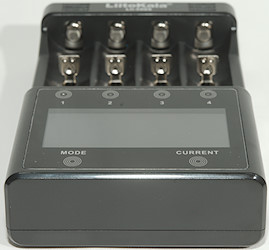
This is a advanced 4 channel charger for LiIon and NiMH with multiple current settings and USB output.






It arrived in a yellow cardboard box with lots of specifications on it.
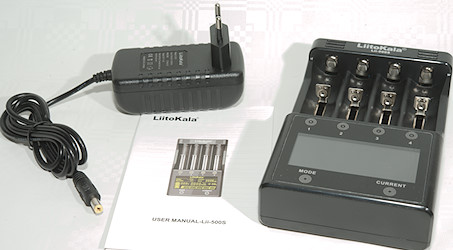
The box contained the charger, power adapter, and a instruction sheet.
The supplied power adapter is a universal voltage (100-240VAC 50/60Hz) with 12V 3A output branded LiitoKala.
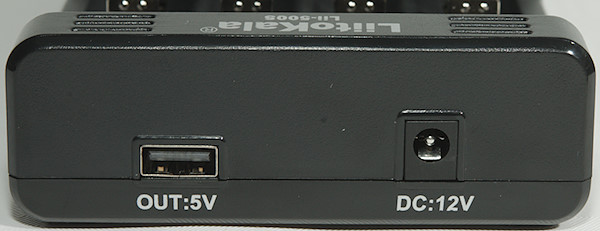
The charger has a DC power input for the mains adapter and a 1A usb output.
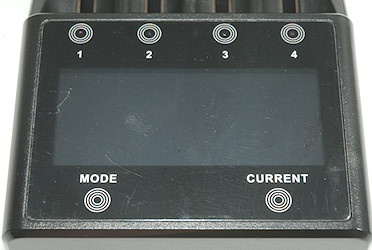
The user interface is 6 touch buttons and a display. The four top buttons is used to select a specific slot, when none of them has been pressed MODE and CURRENT works on all slots simultaneously.
The two bottom buttons is used to select mode (Charge, discharge, test) and current (500, 700, 1000mA, 2000mA). The current is charge current, discharge current will be either 250mA or 500mA.
Once charger is working it is not possible to change settings.
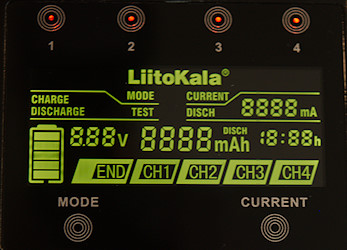
During power on the charger will turn all segments in the display on and the leds in the top buttons, there is both a red and a green led.
As can be seen the display will only show data for one channel at a time.
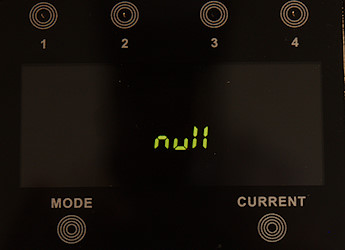
Without batteries in the charger it will show null, until the display turns off.
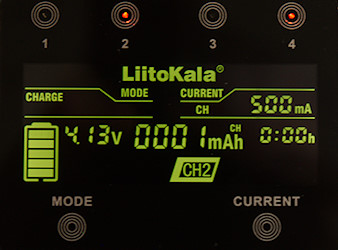
Charging two batteries. This can be seen on the two red leds. The display shows information for slot #2.
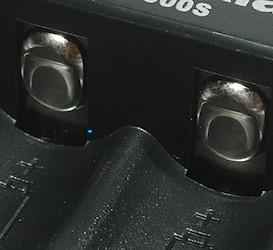
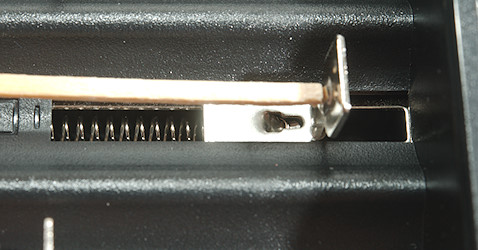
The slots uses the classical slider construction and it works fine.
The slots can work from 32 mm to 74mm. This means that it will handle all protected 18650, 21700 and 26650 cells.
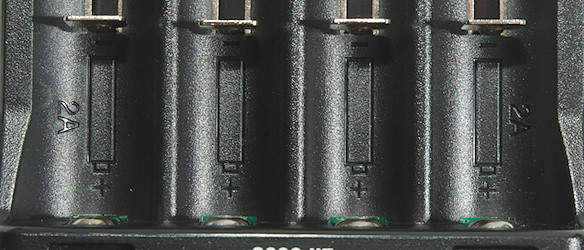
The 2A slots are marked.


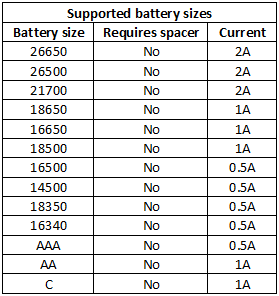
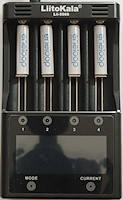
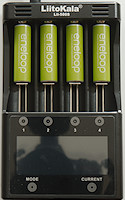
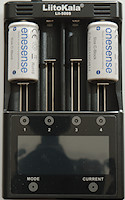

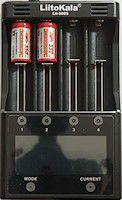
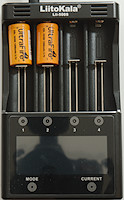
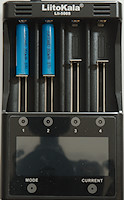
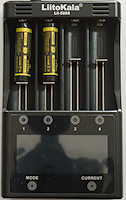
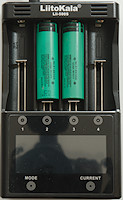
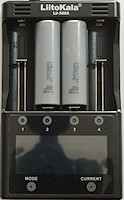
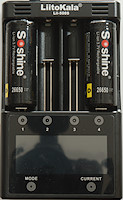
[size=+2]Measurements[/size]
[size=+1]Charge LiIon[/size]
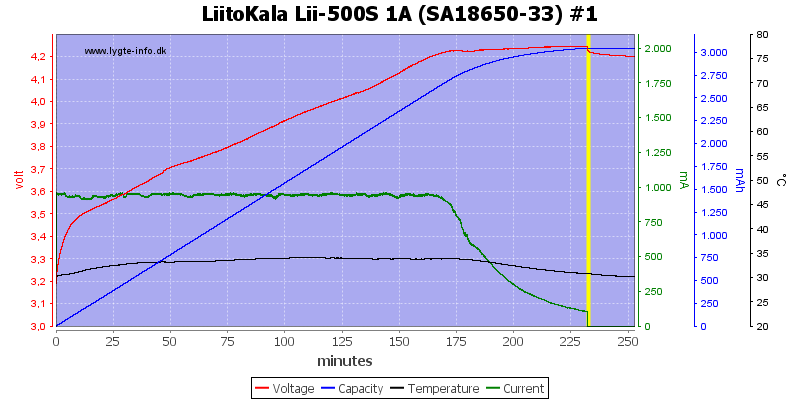
This is a nice CC/CV charge curve with termination at around 150mA
Display shows 3334mAh 3:53
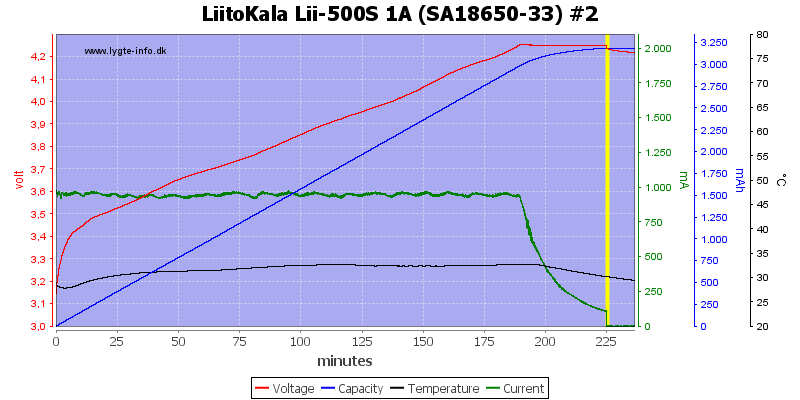
Display shows 3476mAh 3:45
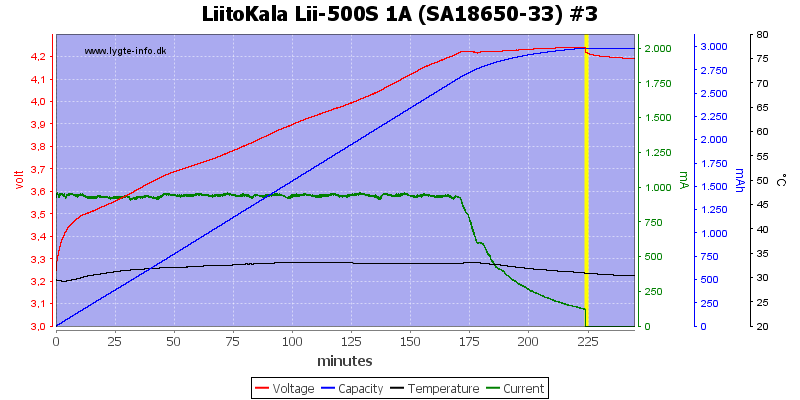
Display shows 3278mAh 3:44
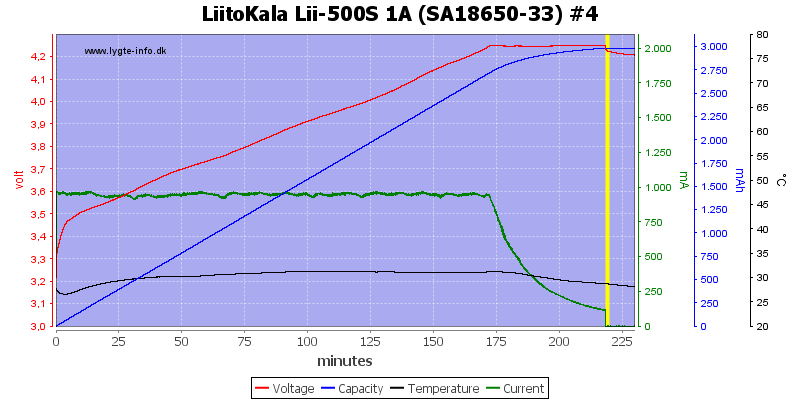
All channels looks fine, but voltage is on the high side.
Display shows 3247mAh 3:39
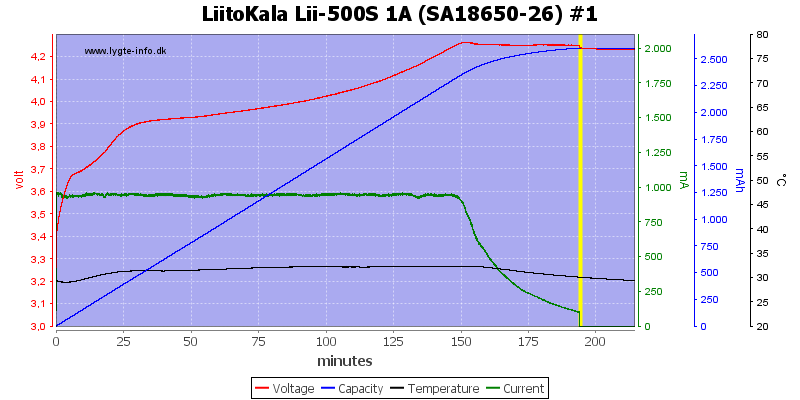
Display shows 2859mAh 3:14
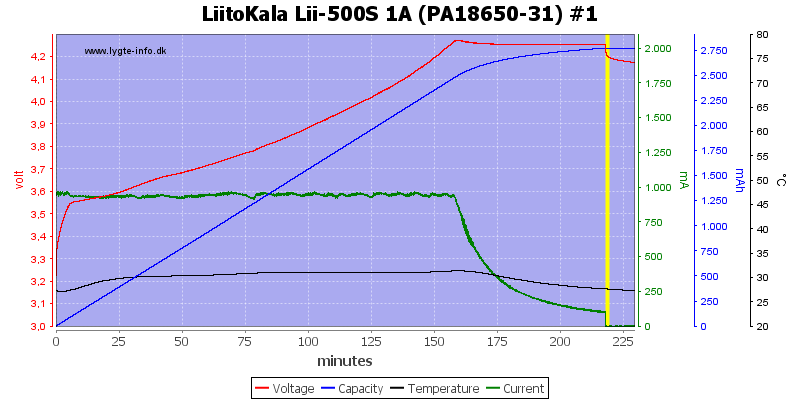
The voltage goes a bit above 4.25V on this cell.
Display shows 2808mAh 5:56
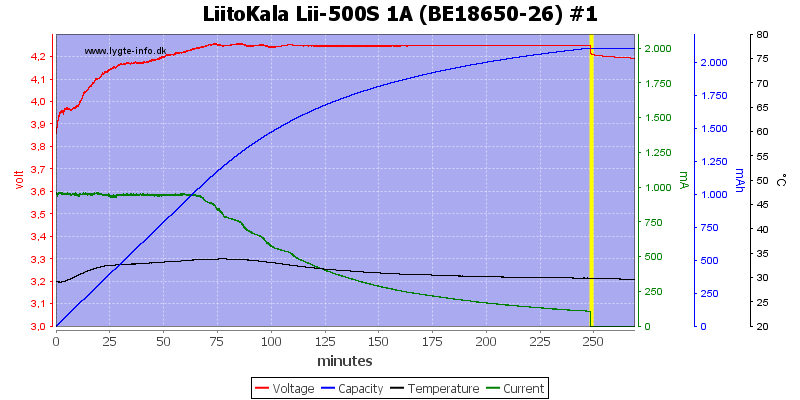
Here the CV voltage phase hovers around 4.25V
Display shows 2290mAh 4:09
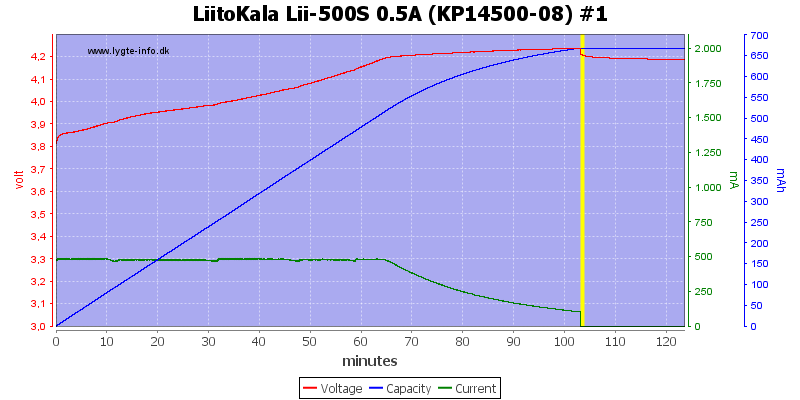
Display shows 723mAh 1:43
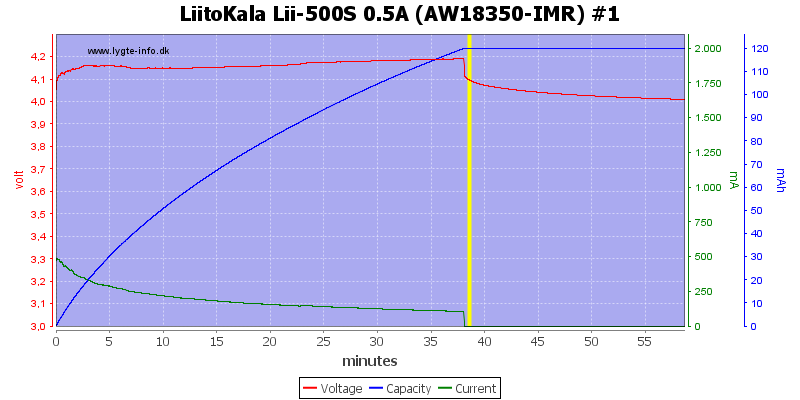
Display shows 130mAh 0:38
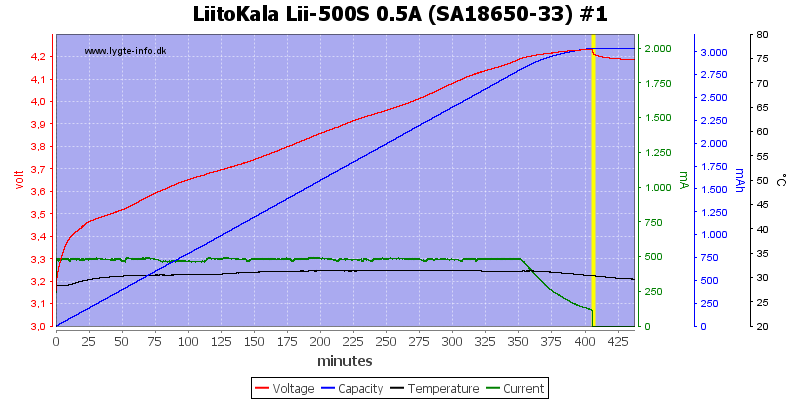
Display shows 3308mAh 6:47
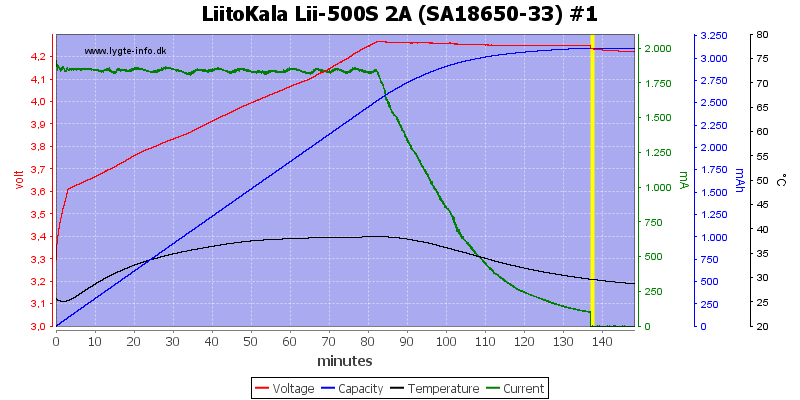
Again the voltage is above 4.25V during charge.
Display shows 3172mAh 2:44
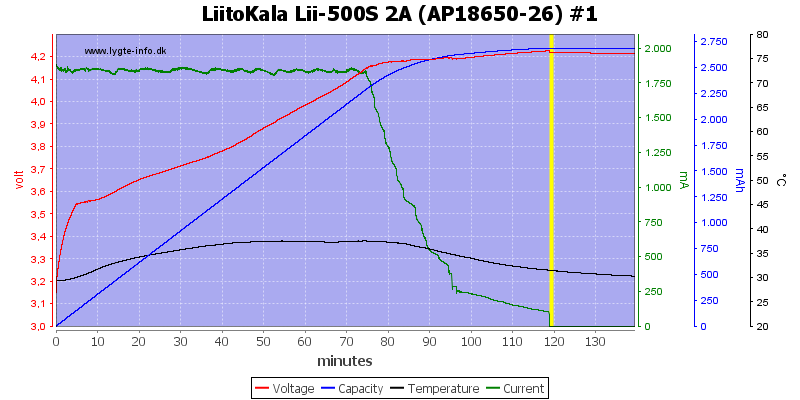
Display shows 2840mAh 1:58
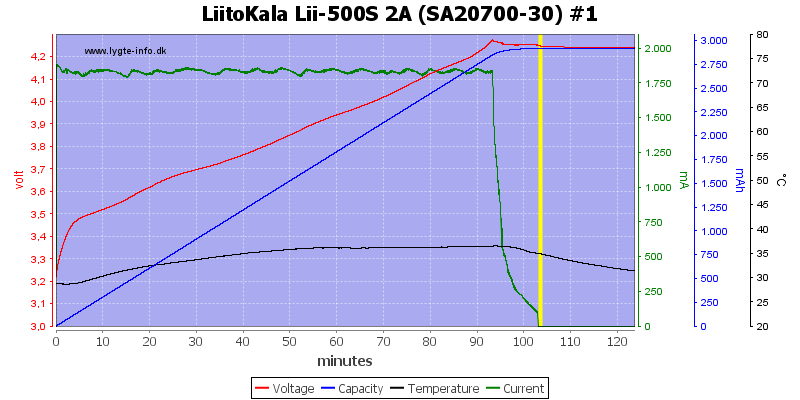
Display shows 3109mAh 1:43
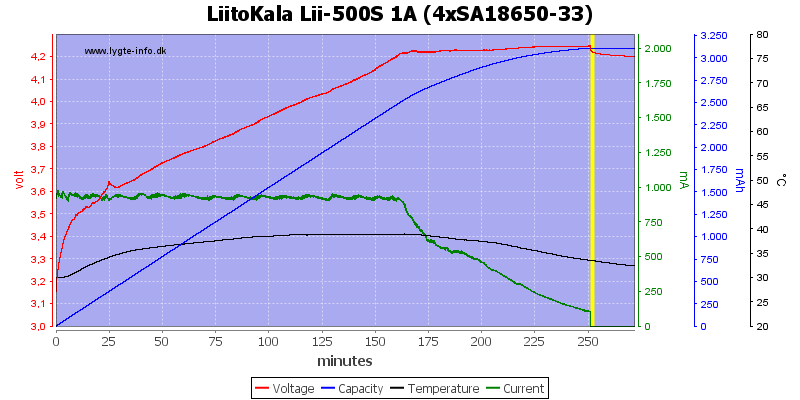
Display shows on slot #1: 3395mAh 3:38
Display shows on slot #2: 3470mAh 3:38
Display shows on slot #3: 3442mAh 3:40
Display shows on slot #4: 3395mAh 3:38
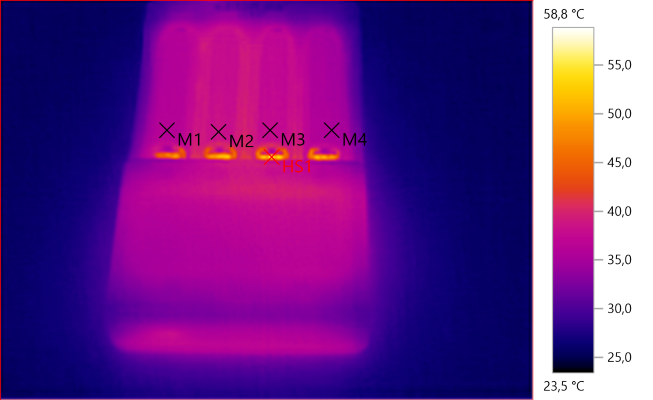
M1: 36.3°C, M2: 38.3°C, M3: 37.8°C, M4: 35.6°C, HS1: 58.8°C
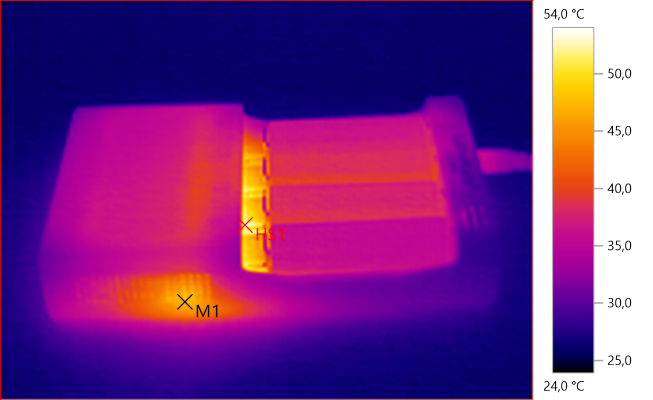
M1: 47.5°C, HS1: 54.0°C
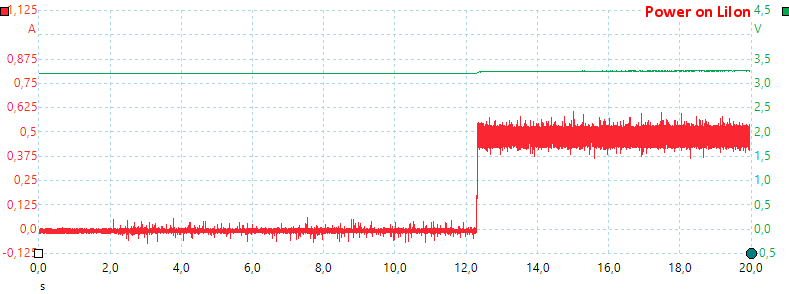
The charger is slow to start, because it waits for user input.
[size=+1]Charge NiMH[/size]
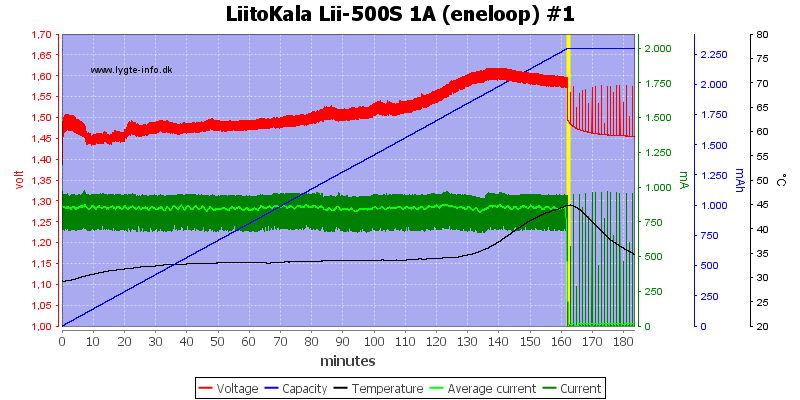
The charger uses a -dv/dt termination, here it needs about 20 minutes to detect it, this means the battery gets fairly hot at the end. Then it continues with a trickle charge of about 17mA
Display shows 2415mAh 2:42
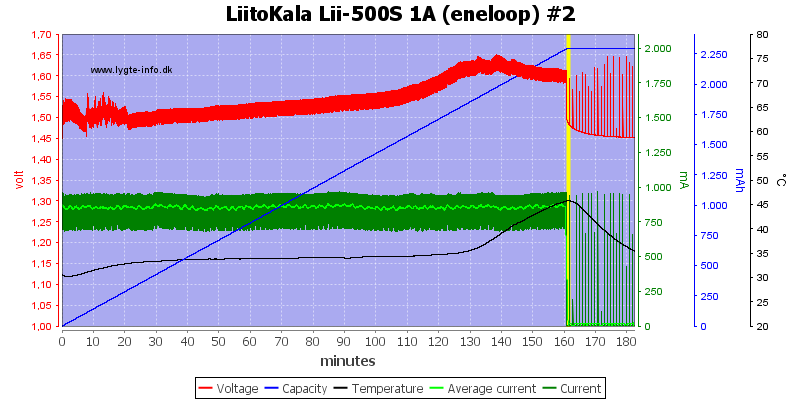
Display shows 2399mAh 2:41
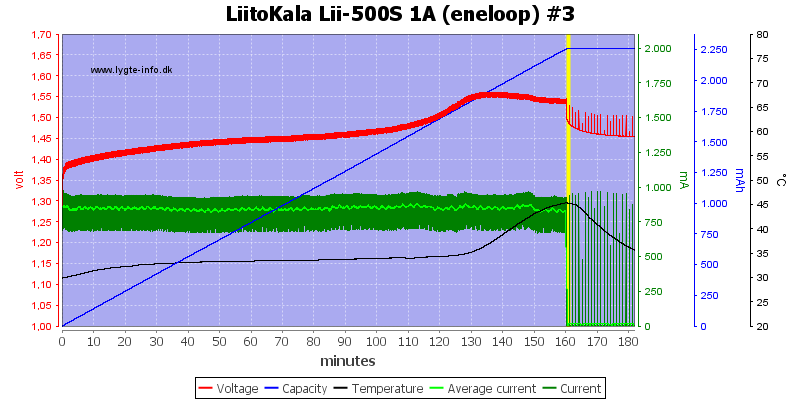
Display shows 2392mAh 2:40
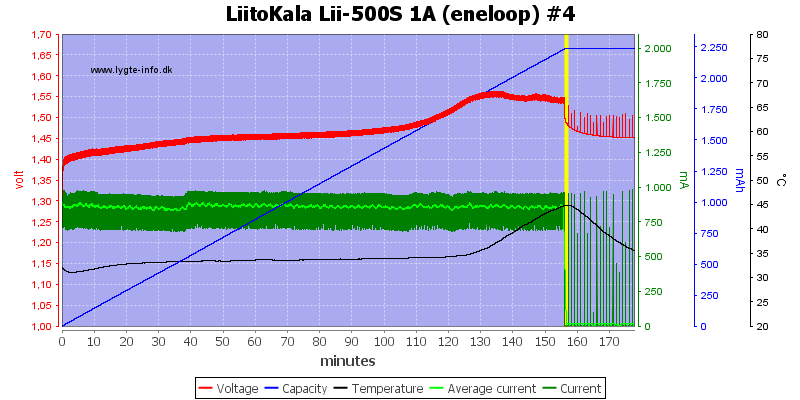
The other four slots are similar
Display shows 2332mAh 2:36
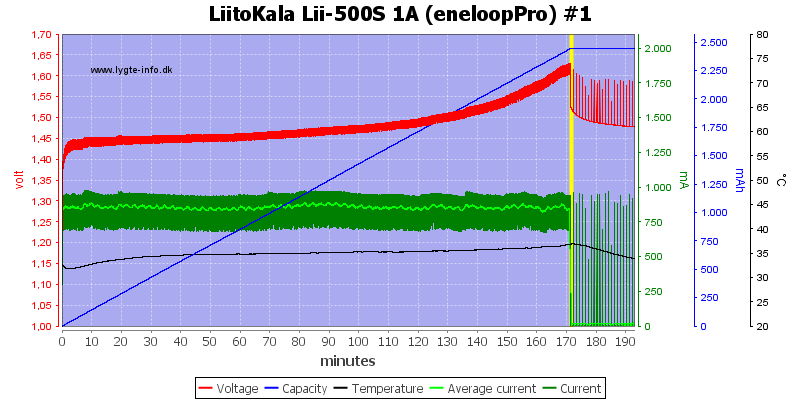
Here is a fast termination, maybe even too fast.
Display shows 2554mAh 2:51
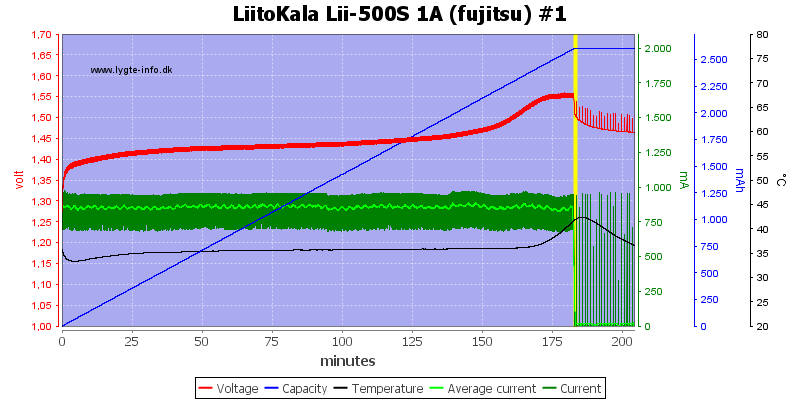
With the Fujitsu cell the termination is fine.
Display shows 3196mAh 3:34
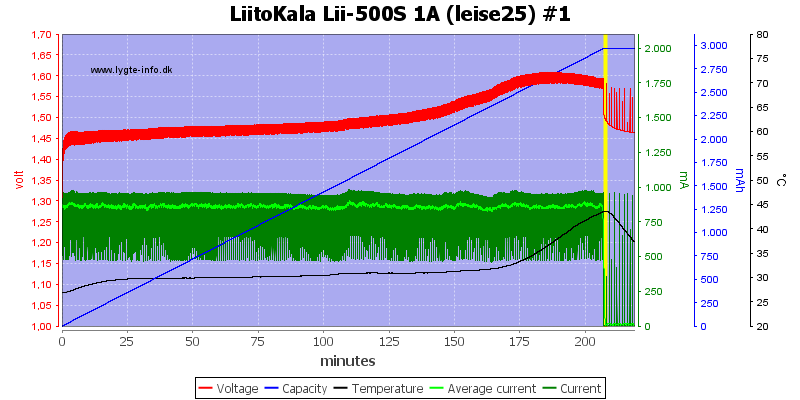
Again a slow termination.
Display shows 3091mA 3:27
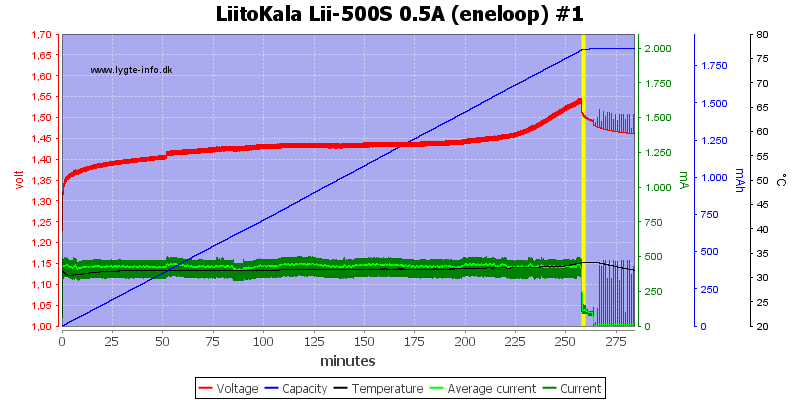
This termination is slight premature.
Display shows 1953mAh 4:24
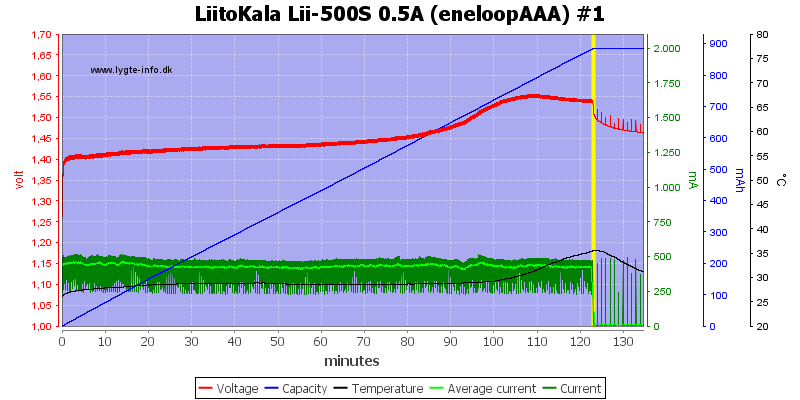
Display shows 911mAh in 2:03
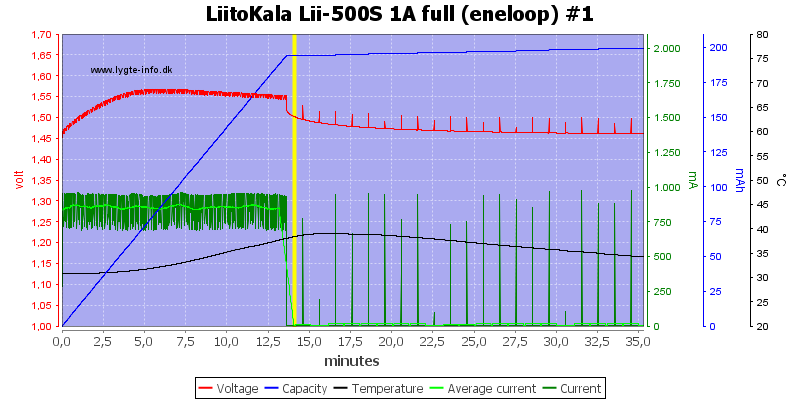
Detection of a full cell is fairly fast for a -dv/dt charger.
Display shows 203mAh 0:13
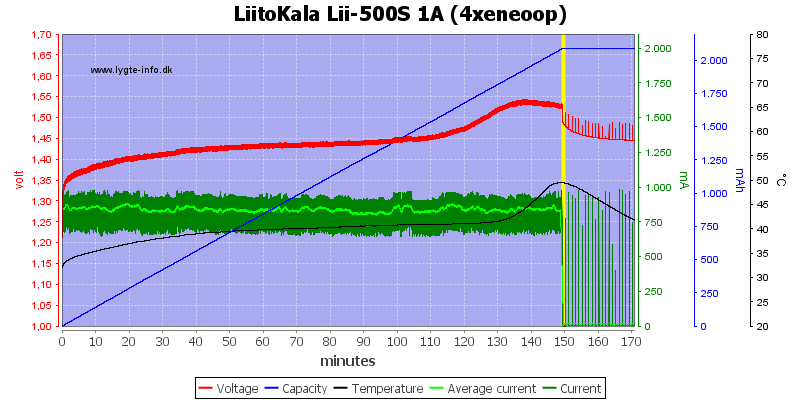
Display shows on slot #1: 2211mAh 2:28
Display shows on slot #2: 2217mAh 2:28
Display shows on slot #3: 2148mAh 2:24
Display shows on slot #4: 2188mAh 2:26
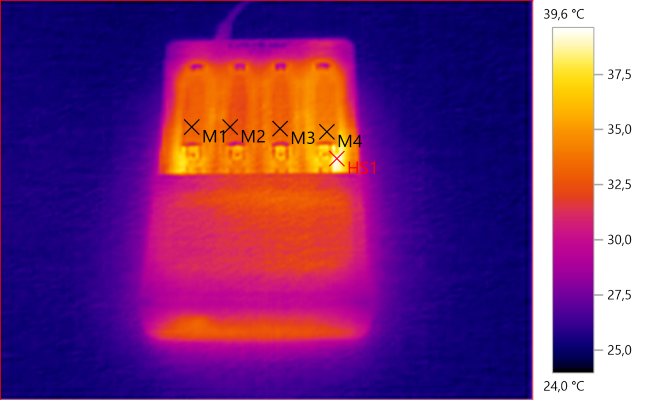
M1: 33.3°C, M2: 32.4°C, M3: 33.2°C, M4: 34.6°C, HS1: 39.6°C
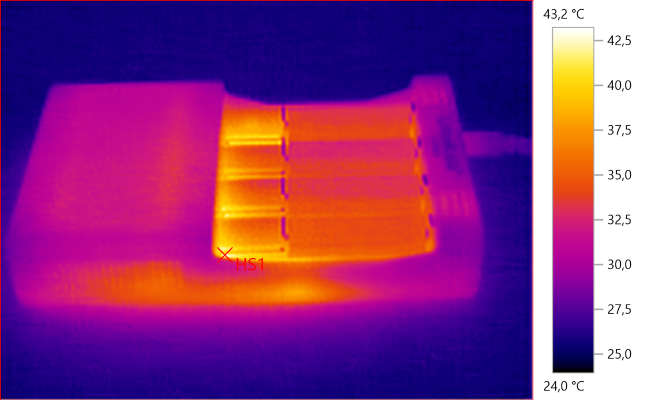
HS1: 43.2°C
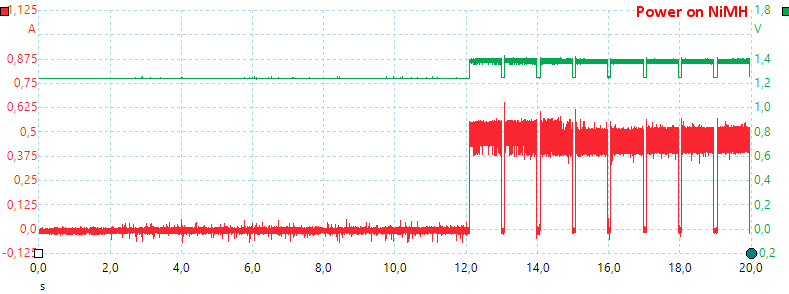
The same slow startup as with LiIon. As usually the charger turns current off to measure voltage.
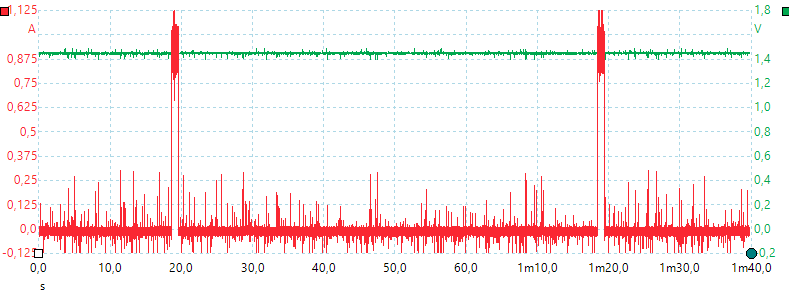
The trickle charge is full charge current for 1 second once a minute, this is about 17mA
[size=+1]Discharge LiIon[/size]
The possible discharge currents are 250mA and 500mA
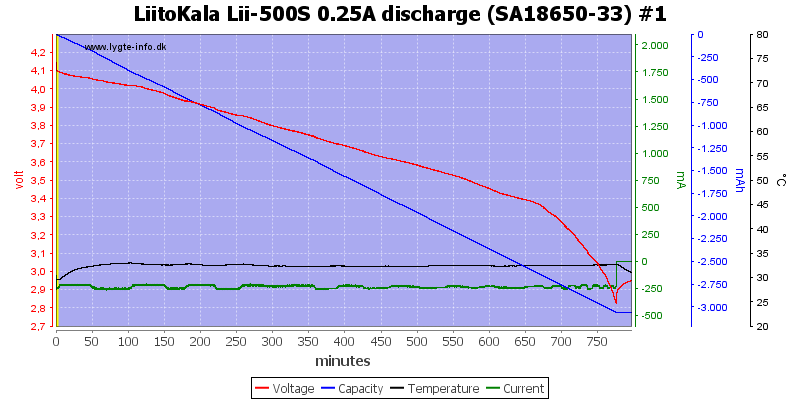
The low discharge setting uses constant current and discharges to about 2.8V
Display shows 3152mAh 13:00 2.80V
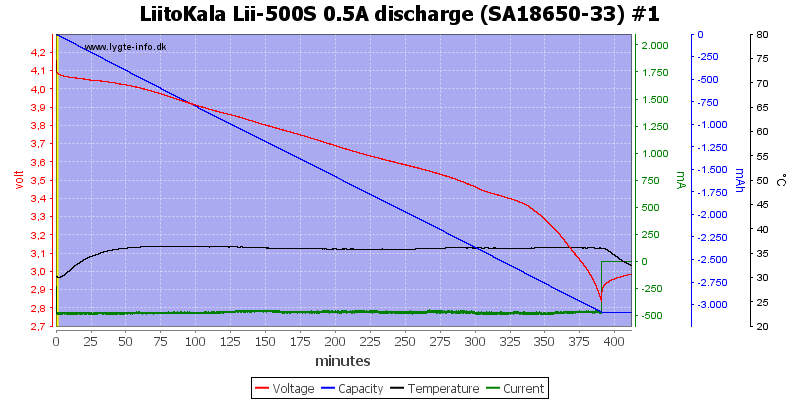
The high setting also uses constant current and discharges to about 2.8V
Display shows 3268mAh 6:32 2.80V
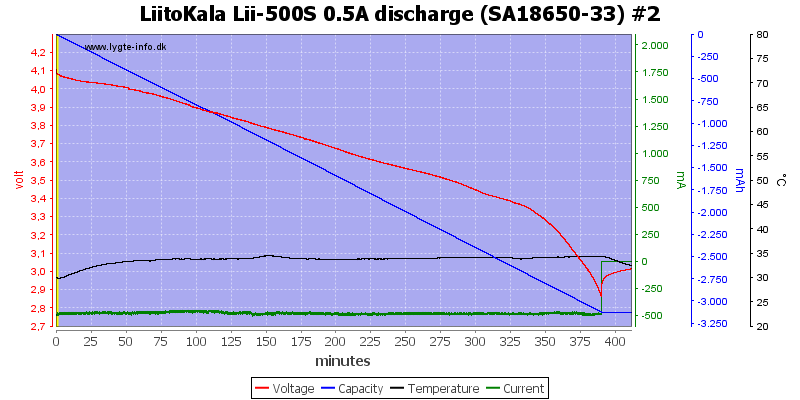
Display shows 3244mAh 6:29 2.80V
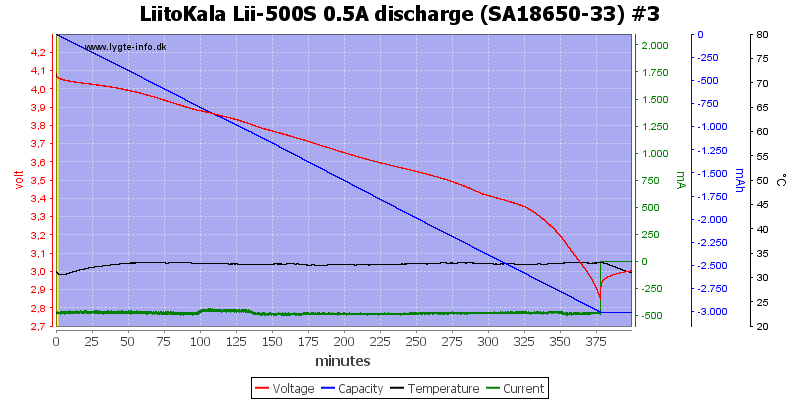
Display shows 3152mAh 6:32 2.80V
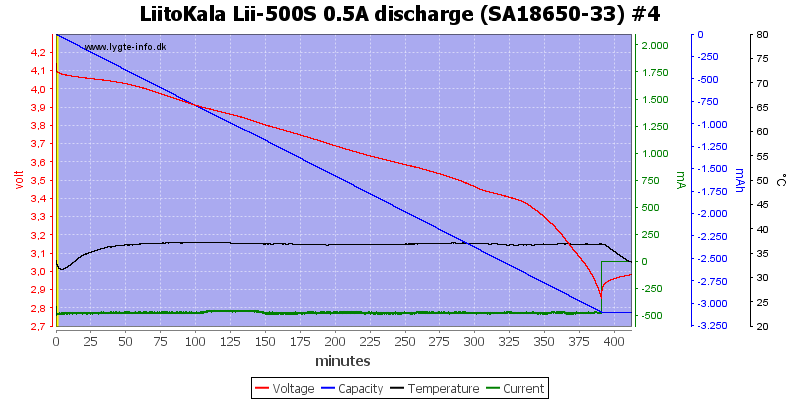
Display shows 3271mAh 6:32 2.80V
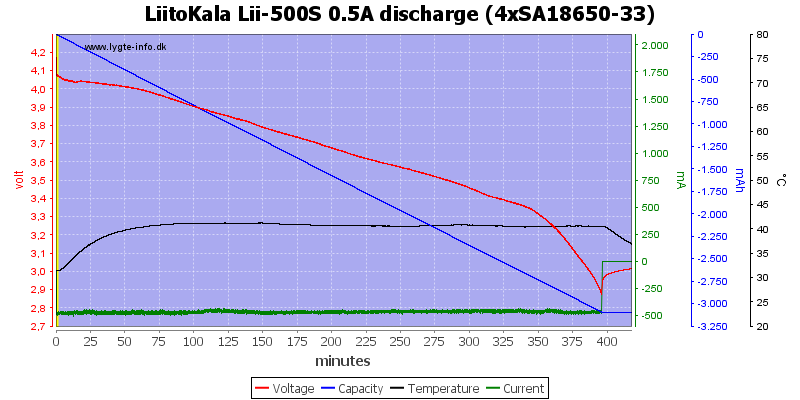
The charger can do four 0.5A discharges at once and temperature is fairly moderate.
Display shows on slot #1: 3277mAh 6:33
Display shows on slot #2: 3372mAh 6:44
Display shows on slot #3: 3346mAh 6:41
Display shows on slot #4: 3329mAh 6:39
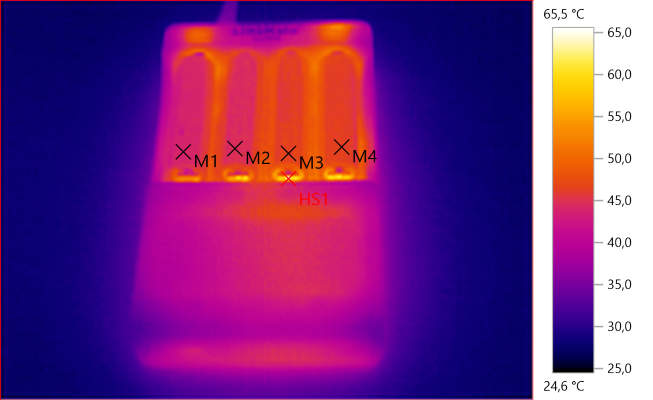
M1: 44.1°C, M2: 44.8°C, M3: 46.2°C, M4: 46.4°C, HS1: 65.5°C
There is some heat while discharging LiIon.
[size=+1]Discharge NiMH[/size]
The possible discharge currents are 250mA and 500mA
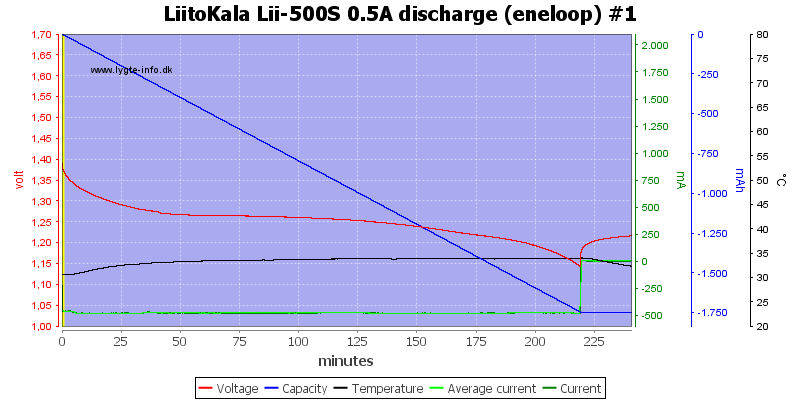
NiMH is discharged with constant current to about 1.1V.
Display shows 1834mAh 3:40 0.9V
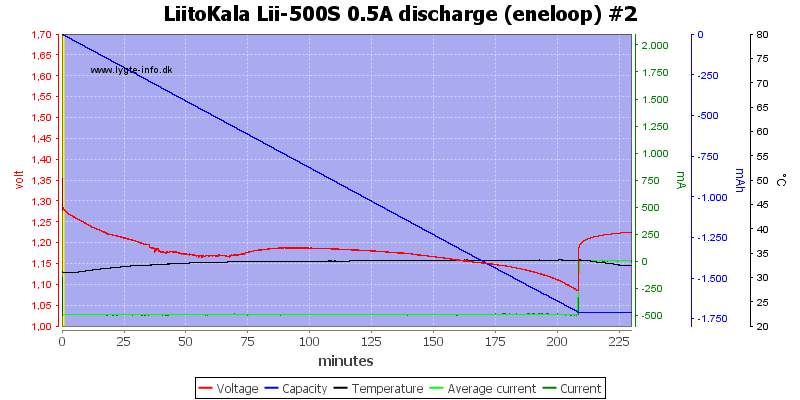
Display shows 1741mAh 3.29 0.9V
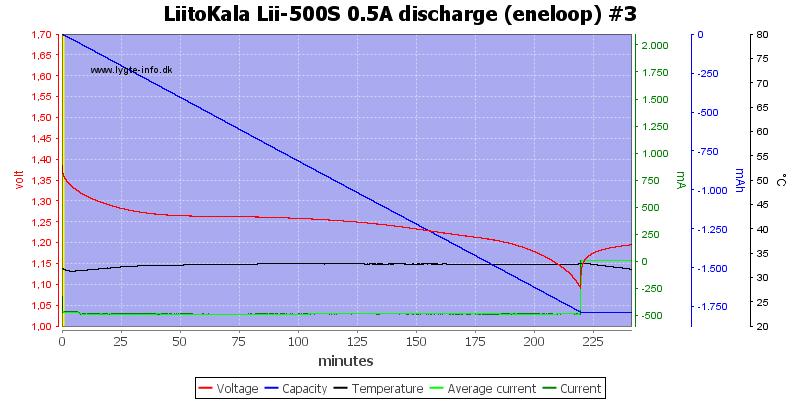
Display shows 1839mAh 3:40 0.9V
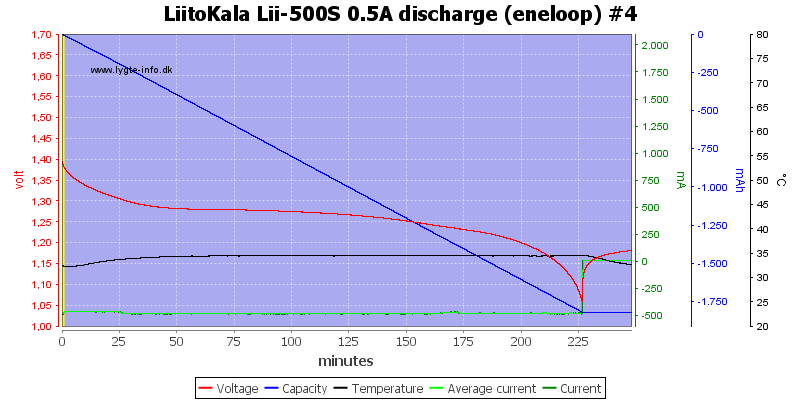
Display shows 1897mAh 3:47 0.9V
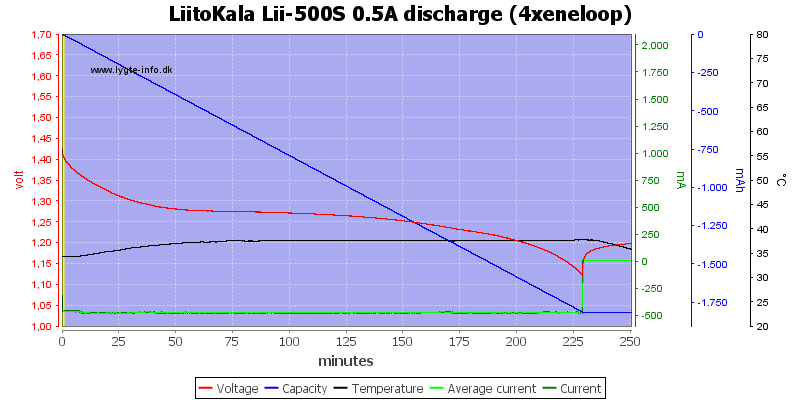
No problem with discharging four cells at a time.
Display shows on slot #1: 1908mAh 3:49
Display shows on slot #2: 1941mAh 3:52
Display shows on slot #3: 1914mAh 3:49
Display shows on slot #4: 1945mAh 3:53
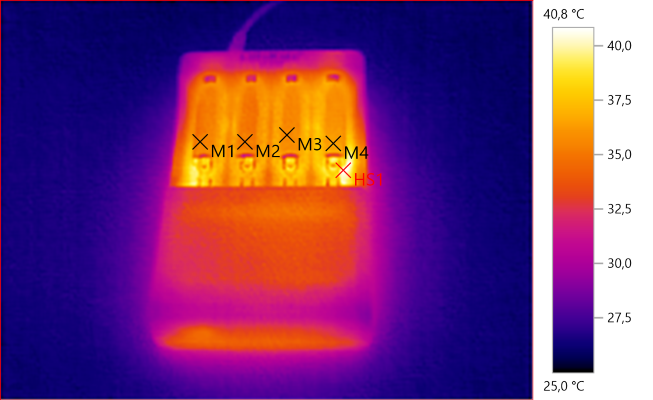
M1: 35.5°C, M2: 35.3°C, M3: 35.9°C, M4: 36.5°C, HS1: 40.8°C
With NiMH the heat is fairly limited.
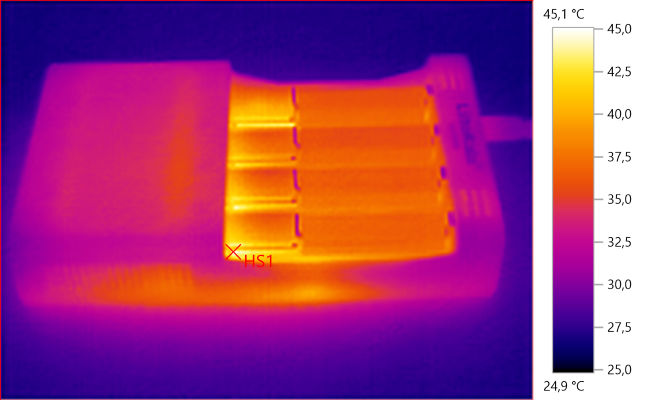
HS1: 45.1°C
[size=+1]Test LiIon & NiMH[/size]
This is a combination of charger, discharge and then charging again, show the result from the discharge.
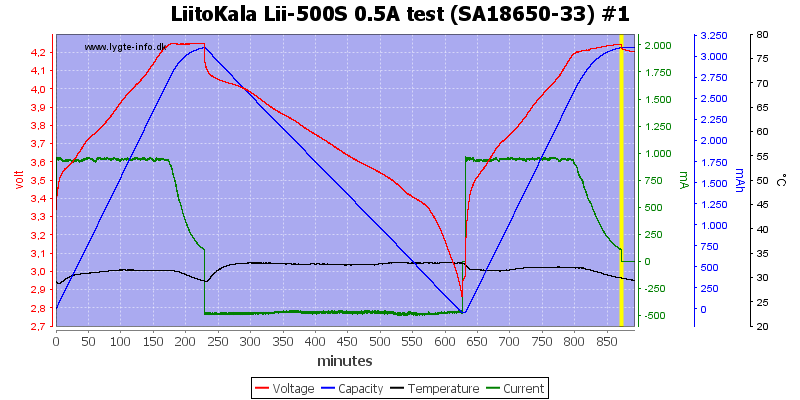
The display shows data for the discharge, the total time used here is about 14.5.
Display shows 3257mAh 6:30
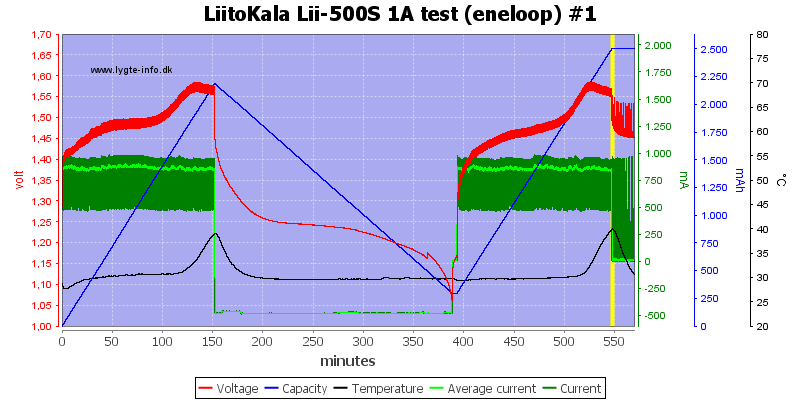
The NiMH is faster the to test, but still takes a lot of time (9 hours).
Display shows 1977mAh 3:57
[size=+1]USB output[/size]
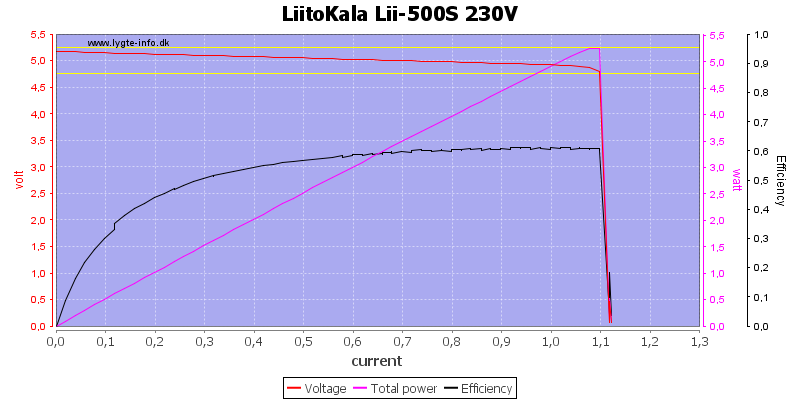
The USB output can deliver 1.1A, this is fine for a 1A USB charger, but not that much current for a modern smartphone or tablet.
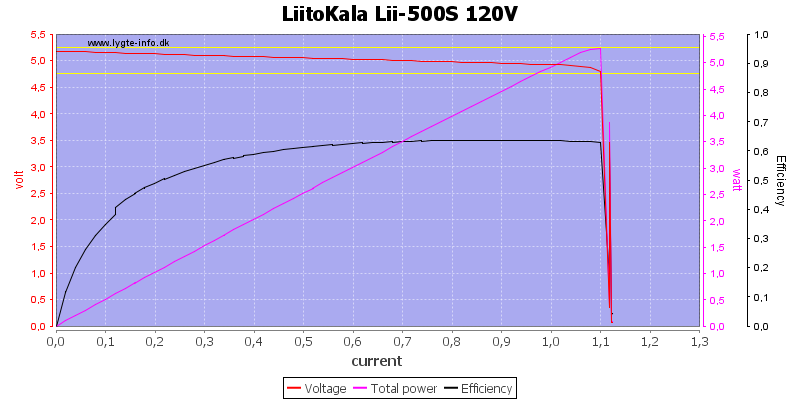
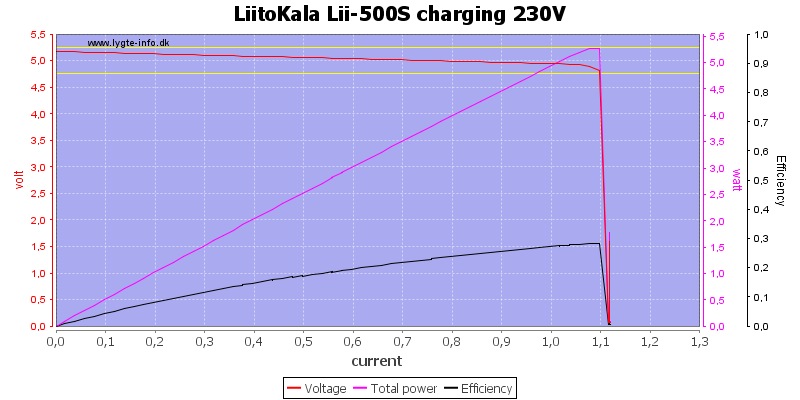
The USB output also works with full power while charging 4 LiIon batteries.
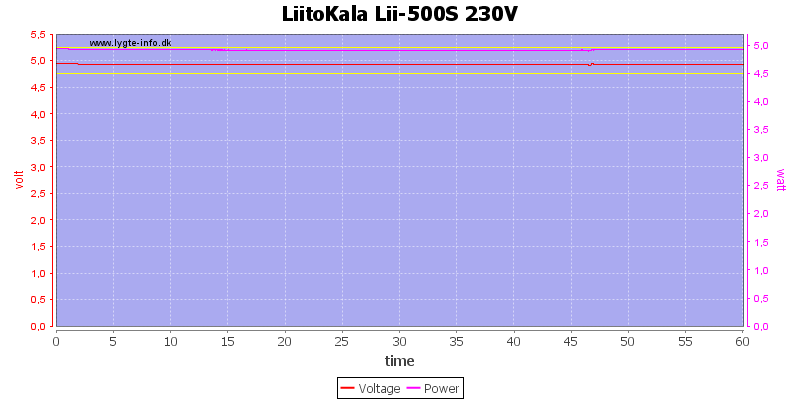
There is no problem running the USB output at 1A for one hour.
The temperature photos below are taken between 30 minutes and 60 minutes into the one hour test.
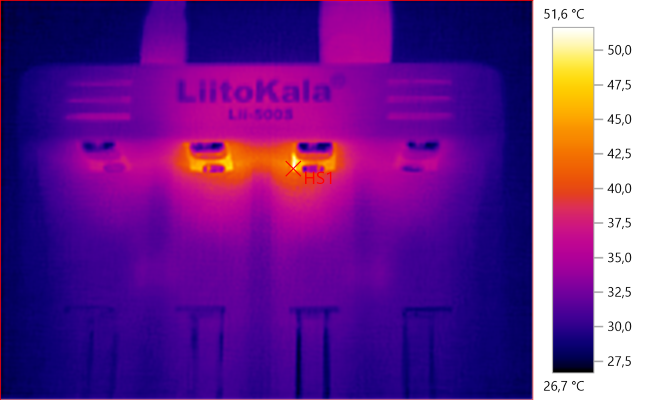
HS1: 51.6°C
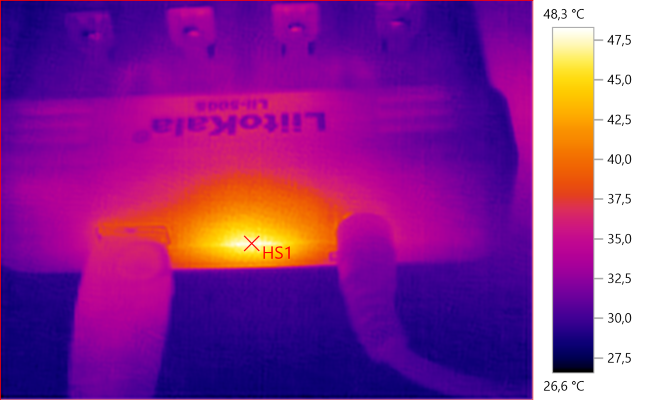
HS1: 48.3°C
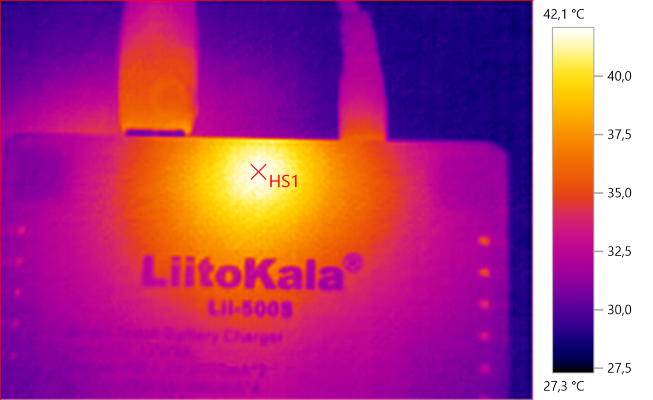
HS1: 42.1°C
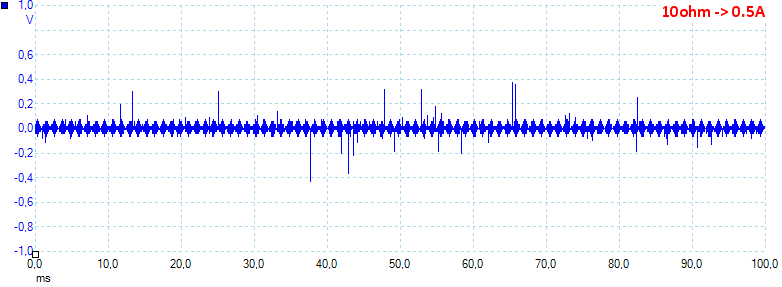
There is 42mV rms and 1403mVpp noise. This is very good values.
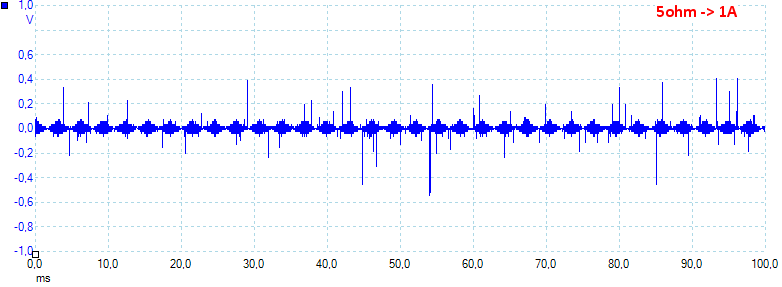
There is 40mV rms and 1324mVpp noise. The high peak level is probably common mode noise from the power supply.
Testing the power supply with 2830 volt worked fine, but it failed 4242 volt between mains and low volt side, this makes it unsafe in 230V countries.
[size=+2]Conclusion[/size]
The charger works, LiIon charge voltage is slightly on the high side, it is not perfect at terminating NiMH and USB output works fine at 1A. The temperature when discharging batteries is acceptable. The displayed capacity values are a bit on the high side.
The failed high voltage test is bad, buying another power supply could fix it.
[size=+2]Notes[/size]
Here is an explanation on how I did the above charge curves: How do I test a charger
Read more about how I test USB power supplies/charger



This is a advanced 4 channel charger for LiIon and NiMH with multiple current settings and USB output.






It arrived in a yellow cardboard box with lots of specifications on it.

The box contained the charger, power adapter, and a instruction sheet.
The supplied power adapter is a universal voltage (100-240VAC 50/60Hz) with 12V 3A output branded LiitoKala.

The charger has a DC power input for the mains adapter and a 1A usb output.

The user interface is 6 touch buttons and a display. The four top buttons is used to select a specific slot, when none of them has been pressed MODE and CURRENT works on all slots simultaneously.
The two bottom buttons is used to select mode (Charge, discharge, test) and current (500, 700, 1000mA, 2000mA). The current is charge current, discharge current will be either 250mA or 500mA.
Once charger is working it is not possible to change settings.

During power on the charger will turn all segments in the display on and the leds in the top buttons, there is both a red and a green led.
As can be seen the display will only show data for one channel at a time.

Without batteries in the charger it will show null, until the display turns off.

Charging two batteries. This can be seen on the two red leds. The display shows information for slot #2.


The slots uses the classical slider construction and it works fine.
The slots can work from 32 mm to 74mm. This means that it will handle all protected 18650, 21700 and 26650 cells.

The 2A slots are marked.














[size=+2]Measurements[/size]
- Power consumption when idle is 1 watt, it drops to 0.8 watt when the display is off.
- When powered the charger will charge a full LiIon battery with about 0.4mA
- When not powered the charger will drain LiIon batteries with 3mA
- When not powered the charger will drain NiMH batteries with 0.4mA
- At 0 volt charger will not recognize any batteries, but show Err and charge with 3mA.
- Above zero volt the charger will start charging with selected current.
- Below 1.8 volt batteries are assumed to be NiMH.
- Between 1.8 and 2V the charger will not recognize a battery type.
- Above 2.0 volt batteries are assumed to be LiIon.
- Charger will not restart if battery voltage drops.
- Charger will restart charging after power loss, or battery insertion.
- Voltmeter do not update when charging is finished.
- Voltmeter has a minimum reading below 0.4V
- Voltmeter is within 0.02 volt when voltage is above 0.8V, .
- Display light will turn off after 30 seconds.
[size=+1]Charge LiIon[/size]

This is a nice CC/CV charge curve with termination at around 150mA
Display shows 3334mAh 3:53

Display shows 3476mAh 3:45

Display shows 3278mAh 3:44

All channels looks fine, but voltage is on the high side.
Display shows 3247mAh 3:39

Display shows 2859mAh 3:14

The voltage goes a bit above 4.25V on this cell.
Display shows 2808mAh 5:56

Here the CV voltage phase hovers around 4.25V
Display shows 2290mAh 4:09

Display shows 723mAh 1:43

Display shows 130mAh 0:38

Display shows 3308mAh 6:47

Again the voltage is above 4.25V during charge.
Display shows 3172mAh 2:44

Display shows 2840mAh 1:58

Display shows 3109mAh 1:43

Display shows on slot #1: 3395mAh 3:38
Display shows on slot #2: 3470mAh 3:38
Display shows on slot #3: 3442mAh 3:40
Display shows on slot #4: 3395mAh 3:38

M1: 36.3°C, M2: 38.3°C, M3: 37.8°C, M4: 35.6°C, HS1: 58.8°C

M1: 47.5°C, HS1: 54.0°C

The charger is slow to start, because it waits for user input.
[size=+1]Charge NiMH[/size]

The charger uses a -dv/dt termination, here it needs about 20 minutes to detect it, this means the battery gets fairly hot at the end. Then it continues with a trickle charge of about 17mA
Display shows 2415mAh 2:42

Display shows 2399mAh 2:41

Display shows 2392mAh 2:40

The other four slots are similar
Display shows 2332mAh 2:36

Here is a fast termination, maybe even too fast.
Display shows 2554mAh 2:51

With the Fujitsu cell the termination is fine.
Display shows 3196mAh 3:34

Again a slow termination.
Display shows 3091mA 3:27

This termination is slight premature.
Display shows 1953mAh 4:24

Display shows 911mAh in 2:03

Detection of a full cell is fairly fast for a -dv/dt charger.
Display shows 203mAh 0:13

Display shows on slot #1: 2211mAh 2:28
Display shows on slot #2: 2217mAh 2:28
Display shows on slot #3: 2148mAh 2:24
Display shows on slot #4: 2188mAh 2:26

M1: 33.3°C, M2: 32.4°C, M3: 33.2°C, M4: 34.6°C, HS1: 39.6°C

HS1: 43.2°C

The same slow startup as with LiIon. As usually the charger turns current off to measure voltage.

The trickle charge is full charge current for 1 second once a minute, this is about 17mA
[size=+1]Discharge LiIon[/size]
The possible discharge currents are 250mA and 500mA

The low discharge setting uses constant current and discharges to about 2.8V
Display shows 3152mAh 13:00 2.80V

The high setting also uses constant current and discharges to about 2.8V
Display shows 3268mAh 6:32 2.80V

Display shows 3244mAh 6:29 2.80V

Display shows 3152mAh 6:32 2.80V

Display shows 3271mAh 6:32 2.80V

The charger can do four 0.5A discharges at once and temperature is fairly moderate.
Display shows on slot #1: 3277mAh 6:33
Display shows on slot #2: 3372mAh 6:44
Display shows on slot #3: 3346mAh 6:41
Display shows on slot #4: 3329mAh 6:39

M1: 44.1°C, M2: 44.8°C, M3: 46.2°C, M4: 46.4°C, HS1: 65.5°C
There is some heat while discharging LiIon.
[size=+1]Discharge NiMH[/size]
The possible discharge currents are 250mA and 500mA

NiMH is discharged with constant current to about 1.1V.
Display shows 1834mAh 3:40 0.9V

Display shows 1741mAh 3.29 0.9V

Display shows 1839mAh 3:40 0.9V

Display shows 1897mAh 3:47 0.9V

No problem with discharging four cells at a time.
Display shows on slot #1: 1908mAh 3:49
Display shows on slot #2: 1941mAh 3:52
Display shows on slot #3: 1914mAh 3:49
Display shows on slot #4: 1945mAh 3:53

M1: 35.5°C, M2: 35.3°C, M3: 35.9°C, M4: 36.5°C, HS1: 40.8°C
With NiMH the heat is fairly limited.

HS1: 45.1°C
[size=+1]Test LiIon & NiMH[/size]
This is a combination of charger, discharge and then charging again, show the result from the discharge.

The display shows data for the discharge, the total time used here is about 14.5.
Display shows 3257mAh 6:30

The NiMH is faster the to test, but still takes a lot of time (9 hours).
Display shows 1977mAh 3:57
[size=+1]USB output[/size]
- When not powered the charger will drain LiIon batteries with 2mA (No USB symbol on display)
- When display is on the charger will drain LiIon batteries with 26mA (Total for all loaded batteries)
- When display is off, but USB output is on the charger will drain LiIon batteries with 13mA (Total for all loaded batteries)
- MODE button will turn display on
- USB output is coded as Apple 1A
- When power is connected, USB output is forced off.
- When the load drops below 70mA the output will turn off in 20 seconds.

The USB output can deliver 1.1A, this is fine for a 1A USB charger, but not that much current for a modern smartphone or tablet.


The USB output also works with full power while charging 4 LiIon batteries.

There is no problem running the USB output at 1A for one hour.
The temperature photos below are taken between 30 minutes and 60 minutes into the one hour test.

HS1: 51.6°C

HS1: 48.3°C

HS1: 42.1°C

There is 42mV rms and 1403mVpp noise. This is very good values.

There is 40mV rms and 1324mVpp noise. The high peak level is probably common mode noise from the power supply.
Testing the power supply with 2830 volt worked fine, but it failed 4242 volt between mains and low volt side, this makes it unsafe in 230V countries.
[size=+2]Conclusion[/size]
The charger works, LiIon charge voltage is slightly on the high side, it is not perfect at terminating NiMH and USB output works fine at 1A. The temperature when discharging batteries is acceptable. The displayed capacity values are a bit on the high side.
The failed high voltage test is bad, buying another power supply could fix it.
[size=+2]Notes[/size]
Here is an explanation on how I did the above charge curves: How do I test a charger
Read more about how I test USB power supplies/charger

